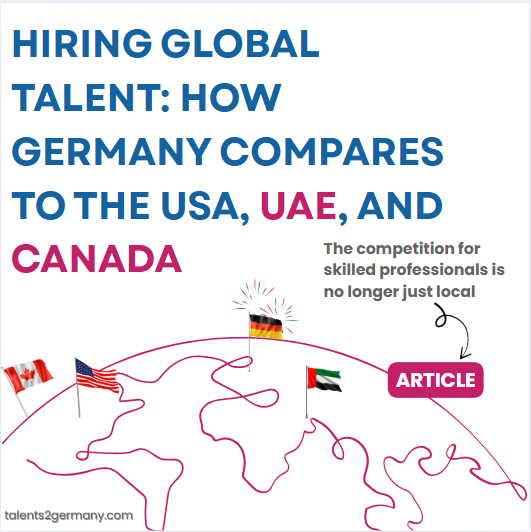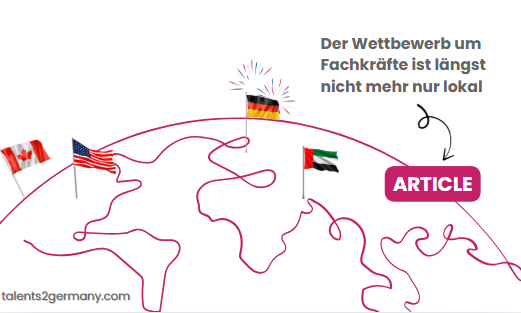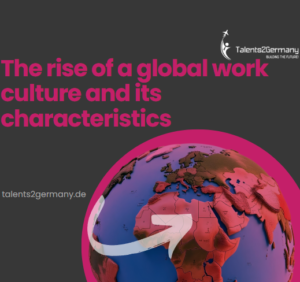
Competing for Global Talent
The competition for skilled professionals is no longer just local, it’s global.Employers are increasingly looking abroad to recruit top talent. However, Germany is not the only country vying for international professionals. The USA, UAE, and Canada are also positioning themselves as attractive destinations for skilled workers.
In this article, we take a broader perspective to compare Germany, the USA, UAE, and Canada, analyzing key factors that matter most to employers seeking to attract and retain top non-EU talent.
1. Visa Stability: Why Germany’s Blue Card Wins
A predictable and structured visa system is one of the most critical factors for skilled professionals considering relocation. Germany provides one of the most transparent and stable pathways to long-term residency.
Germany’s Work Visa System
- The EU Blue Card allows skilled workers to live and work in Germany with a four-year residence permit from the start.
- Professionals can apply for permanent residency after 33 months (or just 21 months if they achieve B1 German proficiency).
- Germany does not use a lottery system for visa allocation, meaning that highly skilled professionals who meet the requirements can be assured of obtaining a work visa.
Comparing with Other Countries
- United States: The H-1B visa is issued through a lottery system, making it highly unpredictable, even for highly qualified candidates. Many applicants must wait years or reapply multiple times to secure a work permit.
- Canada: The Express Entry system is competitive and can be an effective route to residency, but processing times vary, and applicants may wait longer than in Germany.
- United Arab Emirates: Work visas in the UAE are tied to employment, meaning that if a worker loses their job, they lose their residency as well. There is no pathway to permanent residency for most foreign workers.
Why This Matters for Employers
Germany’s transparent, long-term visa system makes it a top destination for professionals looking for stability and career growth. Employers that provide visa sponsorship support will have a hiring edge over companies in the USA and UAE.
2. Long Processing Times at the Ausländerbehörde (Foreigners’ Office)
Germany’s visa and residence processes are structured, but bureaucratic delays are common.
- Many applicants experience long wait times at the Ausländerbehörde (Foreigner’s Office) when applying for residence permits or visa renewals.
- In some German cities, it can take several months to get an appointment, delaying the hiring process.
Comparison with Other Countries:
- The UAE processes work visas within weeks, making it one of the fastest options for professionals.
- Canada’s Express Entry system can be slow, but applicants can track their application status transparently.
- The USA’s H-1B system has long wait times, but once approved, processing is usually faster than Germany’s local immigration offices.
Employer Tip: Employers should provide relocation support services to help new hires navigate Germany’s immigration bureaucracy and paperwork efficiently.
3. Citizenship: Germany Offers One of the Fastest Paths
|
Country |
Time to Citizenship |
Dual Citizenship Allowed? |
|
Germany 🇩🇪 |
3 years |
New rules expanding dual citizenship options |
|
Canada 🇨🇦 |
3 years (after PR) |
Yes |
|
USA 🇺🇸 |
13+ years |
Yes |
|
UAE 🇦🇪 |
Almost never |
No (except for rare cases) |
Key Insight for Employers:
Germany’s recent changes in dual citizenship laws make it an attractive choice for skilled professionals who want a secure long-term career in Europe.
Source: German Federal Foreign Office, UK Home Office, US Department of Homeland Security, Immigration, Refugees and Citizenship Canada, UAE Government Porta
4. Bureaucracy & Paperwork Slows Down Hiring
✔ Germany has complex labor laws and bureaucracy that make hiring slower than in other countries.
- Companies must follow strict employment regulations, including contract structuring, taxes, and social contributions.
- Visa sponsorship requires significant paperwork, and mistakes can lead to delays in onboarding.
✔ Comparison with Other Countries:
- The UAE has streamlined hiring processes, allowing companies to sponsor visas quickly.
- The USA and Canada have legal complexity, but once visas are approved, hiring is faster.
Employer Tip: Work with immigration specialists or use Employer of Record (EOR) services to speed up hiring processes for international talent.
5. Work Visa Options: Why Germany Offers More Security
- Germany’s Blue Card system offers a direct, structured process for skilled workers.
- Canada’s Express Entry is a strong competitor, but processing times are inconsistent.
- The USA’s visa system is risky, with no guarantee of approval due to the H-1B lottery.
- The UAE offers fast visas but no long-term security.
Key Takeaway: Germany removes uncertainty for skilled workers, making it easier for employers to attract global talent.
Source: German Federal Office for Migration (BAMF), UK Gov Skilled Worker Visa Guidelines, US Department of Labor, Canada Express Entry System, UAE Ministry of Human Resources and Emiratisation
6.Higher Tax Burden Compared to the UAE and Canada
Germany’s taxes are among the highest, reducing net salary competitiveness.
-
Germany has a progressive income tax system, with rates up to 45%, plus social security contributions.
-
While these taxes fund public healthcare and social benefits, they reduce the take-home salary for professionals.
Comparison with Other Countries:
-
The UAE has no income tax, making salaries more attractive on paper.
-
Canada’s taxes are high, but in some cases, lower than Germany’s depending on the province.
-
The USA has state-dependent taxes, with some states (like Texas or Florida) having no income tax at all.
Employer Tip: When hiring talent, show a breakdown of Germany’s tax system alongside its benefits (e.g., subsidized healthcare, pension contributions, etc.) to make it more appealing.
7. Salary vs. Cost of Living: A Real Comparison in EUR
To provide a more accurate comparison of salaries and living costs, let’s convert all values to EUR and include additional cost-of-living factors such as groceries, transportation, and taxes.
|
City |
Avg. Salary (Tech Jobs) (€) |
Avg. Rent (2-Bedroom) (€) |
Healthcare Costs (€) |
Public Transport (€) |
Groceries (Monthly) (€) |
Income Tax Rate |
|
Berlin 🇩🇪 |
€60K |
€1,500/month |
Public, employer-subsidized |
€86/month |
€350/month |
~42% |
|
Toronto 🇨🇦 |
€70K (C$100K) |
€1,800/month (C$2,500) |
Public |
€120/month |
€400/month |
~33% |
|
San Francisco 🇺🇸 |
€110K ($120K) |
€3,200/month ($3,500) |
€4,600/year ($5,000+) |
€85/month |
€500/month |
~45% |
|
Dubai 🇦🇪 |
€75K (AED 300K) |
€2,000/month (AED 8,000) |
Private, costly |
€80/month |
€350/month |
0% |
Key Insights for Employers & Talent
✔ Berlin offers a better cost-to-income ratio than high-salary locations like San Francisco.
- Even with a lower salary (€60K), lower rent and public healthcare make it more affordable than the USA.
✔ Germany has higher taxes, but it provides stronger benefits than the UAE or the USA.
- Employer-subsidized healthcare and lower public transport costs mean that employees keep more of their income for essential living expenses.
✔ Dubai has tax-free salaries, but living costs are high.
- Expats pay for private healthcare and expensive housing, offsetting the tax advantage.
✔ Canada offers competitive salaries but higher housing costs.
- Rent in Toronto is higher than Berlin, and income taxes are also significant.
Final Takeaway: A €60,000 salary in Berlin offers a solid standard of living compared to higher salaries in San Francisco because of lower rent, employer-subsidized healthcare, and social benefits. Employers should communicate net salary value, not just gross pay.
Source: Numbeo Cost of Living Index, OECD Economic Outlook, US Bureau of Labor Statistics, Statistics Canada, UAE Federal Competitiveness and Statistics Authority
8. Work-Life Balance: Germany Wins with More Vacation Days
|
Country |
Minimum Paid Vacation + Public Holidays |
Avg. Work Hours/Week |
|
Germany 🇩🇪 |
30 days |
35–40 hours |
|
Canada 🇨🇦 |
15–20 days |
40–45 hours |
|
USA 🇺🇸 |
10 days (no federal mandate) |
45+ hours |
|
UAE 🇦🇪 |
25 days |
48+ hours |
Key Takeaway: German employers should highlight vacation benefits when hiring international talent, especially those coming from overworked job markets.
Source: European Commission Eurostat, UK Gov Employment Rights, US Bureau of Labor Statistics, Canada Labour Code, UAE Employment Law
9. Housing Shortages in Major Cities
✔ Finding affordable housing in cities like Berlin, Munich, and Hamburg can be difficult.
- Germany’s rental market is highly regulated, but demand is much higher than supply, leading to long search times for apartments.
- In Berlin, it can take months for newcomers to find housing, making relocation stressful.
✔ Comparison with Other Countries:
- The UAE offers expat-friendly housing with fast rental agreements.
- Canada and the USA have high rent costs but more housing availability than German cities.
10. Demand for Skilled Workers: Germany Needs More IT Talent
|
Country |
Unfilled IT Jobs |
|
Germany 🇩🇪 |
100,000+ |
|
USA 🇺🇸 |
250,000+ |
|
Canada 🇨🇦 |
40,000+ |
|
UAE 🇦🇪 |
30,000+ |
Key Takeaway: Germany has a strong demand for tech professionals, making it one of the best job markets for global talent.
Source: German Federal Employment Agency, UK Gov Labour Market Statistics, US Bureau of Labor Statistics, Canada Job Bank, UAE Workforce Reports
7. Career Growth: How Talents2Germany Supports Both On-Site and Remote Talent
What’s the Best Career Move? Remote Flexibility or On-Site Growth?
For international professionals looking at Germany, career growth opportunities vary depending on whether they work remotely or relocate. At Talents2Germany, we support both pathways—remote work for flexibility and on-site relocation for faster career advancement.
Why Relocation to Germany Boosts Career Growth
Relocating to Germany can increase career growth potential by up to 90% compared to remote positions.
- On-site employees are prioritized for promotions and have direct access to leadership.
- Germany’s business culture values in-person collaboration, which leads to faster professional development.
Networking and leadership opportunities are more accessible in Germany.
- Being in Germany helps professionals attend industry events, connect with top employers, and access exclusive job opportunities.
- In-person teams have stronger mentorship programs and visibility in decision-making.
Why Remote Work with German Companies is Still Valuable
Talents2Germany helps professionals secure remote jobs with German employers.
- Many companies in tech, digital marketing, and design offer remote-friendly positions.
- A remote job with a German company can serve as a stepping stone to relocation later on.
Hybrid models allow candidates to work remotely first, then relocate when ready.
- Some employers hire talent remotely first and then offer relocation support to top performers.
How Talents2Germany Helps Candidates Find the Right Fit
We match professionals with German companies that support both remote work and relocation.
For remote-first candidates, we help secure German contracts that provide competitive salaries and future relocation options.
Key Takeaway
Talents2Germany supports both remote and on-site career paths, depending on what works best for each professional. Relocation to Germany offers the fastest career growth, but remote jobs with German companies can also be a great entry point for international talent.
Source: LinkedIn Global Workforce Report, McKinsey Global Institute, European Labour Market Report, US Remote Work Trends, UAE Business Environment Reports
12. Recognition of Foreign Degrees: Germany is More Accessible
Why Degree Recognition Matters
For international professionals, having their degrees recognized quickly is crucial for entering the job market. Some countries require lengthy equivalency evaluations, causing delays in hiring and work authorization.
Germany Has a More Inclusive Approach
✔ Germany recognizes more foreign degrees, especially in IT and engineering, without additional exams or lengthy verification processes.
- The Zentralstelle für ausländisches Bildungswesen (ZAB) evaluates and recognizes foreign qualifications, making the process smoother.
- IT specialists and engineers from non-EU countries can often start working immediately after obtaining a Blue Card, without additional licensing.
- The Anerkennung in Deutschland portal provides an easy way for professionals to check whether their degree is recognized.
Degree Recognition Barriers in Other Countries
The USA and Canada require extensive degree equivalency evaluations, which can delay hiring:
- The USA often requires foreign professionals to complete additional coursework to meet licensing requirements.
- Canada mandates credential assessments through organizations like WES (World Education Services), which can take months.
UAE employers often prioritize degrees from Western institutions, meaning professionals with qualifications from non-Western countries may struggle to get hired.
Key Takeaway
Germany’s faster and more flexible degree recognition system makes it easier for skilled workers to enter the job market quickly. Employers can attract international talent by emphasizing the streamlined recognition process for IT and engineering professionals.
Source: German Central Office for Foreign Education (ZAB), UK NARIC, US Department of Education, Canadian Information Centre for International Credentials (CICIC), UAE Ministry of Education
13. Long-Term Stability: Germany Outperforms UAE and USA
9. Long-Term Stability: Germany Outperforms UAE and USA
Why Long-Term Stability Matters
For skilled professionals looking to relocate, job security is only part of the equation—many want a clear path to permanent residency and citizenship. Countries that offer long-term stability attract top talent because professionals can plan for their careers, families, and future investments with confidence.
How Germany & Canada Lead
✔ Germany and Canada offer structured, long-term residency programs that lead to citizenship.
- Germany’s Blue Card system allows professionals to apply for permanent residency after 33 months (or 21 months with B1 German).
- After 3 years, professionals in Germany can apply for citizenship, allowing them to live and work freely across the EU.
- Canada follows a similar model, where PR holders can apply for citizenship after three years.
Challenges in the USA & UAE
The USA and UAE have uncertain residency paths that limit long-term career planning.
- In the USA, the Green Card process is slow and unpredictable, often taking 10+ years.
- The H-1B visa is tied to employer sponsorship, meaning job loss can put workers at risk of visa expiration.
- The UAE does not offer permanent residency or citizenship for most foreign professionals—residency is always linked to employment, creating uncertainty for long-term plans.
Key Takeaway
Germany is one of the most secure long-term options for skilled professionals, offering a clear and structured path to PR and citizenship. Employers should highlight this advantage to attract top international talent who want career stability and a secure future.
Source: German Federal Office for Migration (BAMF), UK Home Office, US Department of Homeland Security, Canada Permanent Residency Program, UAE Federal Authority for Identity and Citizenship
14. Conclusion: Why Germany is the Best Destination for Hiring Non-EU Talent
|
Factor |
Germany 🇩🇪 |
USA |
UAE 🇦🇪 |
Canada 🇨🇦 |
|
Visa Stability |
Strong |
Lottery-based |
Job-dependent |
Good |
|
Citizenship |
3 Years |
13+ Years |
No Path |
3+ Years |
|
Cost of Living |
High Taxes, but employer-subsidized benefits |
Expensive |
High Rent |
High Taxes |
|
Job Market (IT) |
Growing |
Growing |
Smaller |
Growing |
Key Takeaways for Employers
-
Visa Stability: Germany’s Blue Card provides long-term security with a clear PR pathway, unlike the USA’s unreliable H-1B system or UAE’s job-dependent residency.
-
Citizenship: Skilled workers can apply for German citizenship after 5 years, much faster than the USA’s 13+ years and UAE’s lack of a citizenship pathway.
-
Cost of Living: While Germany has higher taxes, employees benefit from mandatory health insurance (50% employer-covered), affordable public transport, and subsidized childcare, making overall expenses more manageable.
-
Job Market (IT): Germany has 100,000+ unfilled IT positions, making it a prime hiring market, while UAE’s market remains smaller and Canada’s job competition is higher.
Final Thought for Employers: Germany offers a strong mix of visa stability, job demand, and long-term security, making it one of the best destinations for hiring skilled non-EU professionals.
Source: OECD Economic Surveys, European Commission Migration Report, US Bureau of Labor Statistics, Canada Immigration Trends, UAE Workforce Market Analysis




